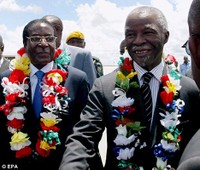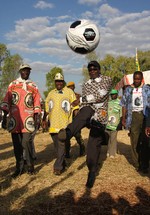Regular readers may wonder why you haven’t seen any fiction here for a long time.
The reason is Thabo Mbeki.
When I began The Chinese Century, then The American Diaspora, I was trying to distance myself from the reality around me, and building (in my mind) a different kind of utopia on a foreign shore. I recognized that from the start, but it didn’t stop me. When I picked up The Duke of Oil it was with the intention of finishing that story out, embracing the idea of a different energy future and tracking the fall of the Bush Administration characters who had brought us to this end.
But as I wrote the idea of a South African utopia, as opposed to the dystopian reality, became less and less possible to me.
The reason was Thabo Mbeki.
I first saw Mr. Mbeki as a sort of John Adams figure in South Africa.
He wasn’t the great hero. He was the principled follower, perhaps the
principal behind many of those principals. He might make some mistakes,
but he would be a good shepherd.
He wasn’t. He has proven in office to be an arrogant fool. And the
biggest mistake he has made is to lock his policies away in his own
country, and seek to ignore the wider world.
Even America is having trouble with that policy. No matter how high the
fence you build, no matter how harshly you may treat immigrants, the
poverty and desperation which drove them here will continue to drive
them here if it is not addressed. There is great violence on our
border, there is great injustice on our border, and our only answer from here
seems to be to tighten the lid while it continues to boil. We have
immense ability to do that, although at immense cost to people on both
sides of that border, and the explosion will be put off into the next
decade.
This was never true for South Africa. Failures of leadership elsewhere
in Africa could always be expected to spill into it. Even a decade ago
South Africa was bringing in Sudanese and Nigerian and Congolese
immigrants, to replace the black South Africans in its own shantytowns,
or rub shoulders with them.
With Zimbabwe it has proven to be too much.
I’m not talking about Robert Mugabe’s oppression here, or the impact of
the destruction of his country on the people inside Zimbabwe. I’m
talking about the natural result of that oppression, the movement of
vast numbers of refugees into adjacent countries, and the destruction
this has caused.
What it has done in South Africa is transform a people whose heritage
is liberty and the fight against oppression into oppressors. The
attacks on Zimbabweans, and other immigrants, now taking place in South
Africa are scarring the South Africans who participate in them, even
before most of them can achieve the kind of lifestyle that would help
them rationalize it.
The result is that the majority of South Africans have lost their
rationality, have lost their compassion, have lost the emotional and
intellectual magnanimity which are at the real heart of a democratic and capitalistic culture. The last proof of this will likely
happen next year when the 2010 World Cup is hurriedly removed from that
country, for the safety of participants and fans, moved perhaps to
England. Or the proof could be the fiasco that World Cup becomes if it
remains in South Africa, where the people are no longer in any
emotional, financial or physical position to host it.
All this is Thabo Mbeki’s doing. He has stood by passively while the
world around him burned. He has imagined that a grassfire might start
in a neighboring yard and not touch him. So many in the American West
will understand the analogy.
I wrote of Johannesburg as a shining city on the hill, compete with
replicas of the World Trade Center, and hosting global-scale trading
markets through the efforts of a few hundred thousand westerners and
some entrepreneurial dreamers. I know now that was an impossible dream,
and that running away from my own country, even if just in my mind, was
stupid.
I may pick it up again, someday. I will start, then, from a clear
outline, filling in the blanks with action and dialogue, with
description and humor. I won’t do what I did before, sit before a blank
page and see what comes out. All that did was getting me from the
frying pan into the fire.
I do find it interesting, however, that the predictions of energy
crisis and financial hurt which I foresaw happening suddenly in The
Chinese Century are nevertheless taking place, albeit more slowly, in
2008. I take no satisfaction from that.












